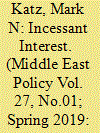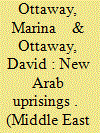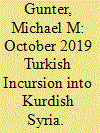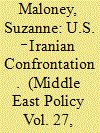|
|
|
Sort Order |
|
|
|
Items / Page
|
|
|
|
|
|
|
| Srl | Item |
| 1 |
ID:
172028


|
|
|
|
|
| Summary/Abstract |
A meeting in Berlin in January 2020 dedicated to a settlement in Libya — unlike the failed international conference held in Palermo in 2018 — leaves a slight hope for the implementation of conditions laid out in its final document. The essence of the proposals is to fix the state of things established in Libya at the end of last year. The meeting in Istanbul between Russian President Vladimir Putin and Turkish leader Recep Tayyip Erdogan that preceded the negotiations in Berlin implied the same thing. Their joint statement after the talks on January 8, 2020, stressed the impossibility of a unilateral solution to the Libyan problem: “Seeking a military solution to the ongoing conflict in Libya only causes further suffering and deepens the divisions among Libyans.”
|
|
|
|
|
|
|
|
|
|
|
|
|
|
|
|
| 2 |
ID:
172031


|
|
|
|
|
| Summary/Abstract |
The global energy market is at a crossroads of significant change. The oil market, which accounts for the largest portion of world energy consumption, is facing rapid transformation,1 posing a significant challenge to countries in the Middle East that have traditionally been suppliers. The market is witnessing three major game changers. First, through global efforts to reduce the consumption of fossil fuels (oil, gas and coal) in response to climate change, oil demand is expected to taper off over the medium and long term. Second, the shale revolution in North America, by fueling U.S. production of oil and gas, has resulted in a trend toward low oil prices. The revolution has even influenced U.S. policy in the Middle East, once regarded as a region of vital interest. Finally, the conflicts in the Middle East are threatening the world as well as the region. Although the international economic sanctions on Iran were lifted because of the nuclear deal in January 2016, the Trump administration implemented further unilateral sanctions in May 2018, banning oil exports from the country and increasing geopolitical risks in the global market. Major importers relying on Iranian oil are now turning to alternative suppliers.
|
|
|
|
|
|
|
|
|
|
|
|
|
|
|
|
| 3 |
ID:
172034


|
|
|
|
|
| Summary/Abstract |
Russia is a country that Western and other observers have often claimed pursues a grand strategy, and that it does so far more determinedly and successfully than its Western counterparts. The Middle East is a region in which not just the Soviet Union and now Putin's Russia have been described as successfully pursuing grand strategies. Tsarist Russia also did, and for a longer period than its successors. Still, both the Tsars and the Soviets experienced setbacks in the Middle East and elsewhere. However, as Russian observers have noted proudly (and Western ones ruefully), Russia has displayed a knack for recovering from setbacks and often becoming even stronger than before — thus enhancing its reputation for successfully pursuing a grand strategy.
|
|
|
|
|
|
|
|
|
|
|
|
|
|
|
|
| 4 |
ID:
172032


|
|
|
|
|
| Summary/Abstract |
When the Arab Spring erupted in 2011, rulers in the Middle East and North Africa took numerous measures to quell the popular discontent that was boiling over. Shrewd leaders understood that institutions needed to act as valves to release pent‐up political pressure. In Oman, a country with strong Arab traditions and moderate attitudes, Sultan Qaboos introduced a string of measures to address public grievances, including a minimum‐wage hike and stepped‐up efforts to create jobs.1 The sultan also permitted Islamic banking in the country for the first time.
|
|
|
|
|
|
|
|
|
|
|
|
|
|
|
|
| 5 |
ID:
172029


|
|
|
|
|
| Summary/Abstract |
The Hashemite Kingdom of Jordan has been caught lately between domestic and regional upheavals that have alarmed King Abdullah II. Although the 2011 Arab uprisings did not engulf Jordan as they did Tunisia and Egypt, economic recession and increased unemployment remain major challenges facing the monarchy. Besides being threatened by public protests and a decline in subsidies from the Gulf sheikdoms — Saudi Arabia, in particular — that have helped keep Jordan stable for several decades, Abdullah has recently diversified the country's foreign relations by reopening talks with Turkey and Qatar.
|
|
|
|
|
|
|
|
|
|
|
|
|
|
|
|
| 6 |
ID:
172027


|
|
|
|
|
| Summary/Abstract |
Policy makers, academics and the media have characterized the post‐Arab Spring era as a period of great upheaval, chaos and turbulence, at times making comparisons to the Balkans. These characterizations are relatively imprecise, unhelpful and inaccurate. Closer scrutiny reveals that an increasing number of countries are adopting historically familiar behaviors and outcomes. Parts of the Levant, North Africa and the Gulf are closely mimicking Lebanon. Recognizing and understanding these parallels makes Lebanon a valuable tool for the advisers who are informing current U.S. policy and preparing for future challenges.
|
|
|
|
|
|
|
|
|
|
|
|
|
|
|
|
| 7 |
ID:
172026


|
|
|
|
|
| Summary/Abstract |
A second wave of uprisings broke out in Algeria, Sudan, Lebanon and Iraq during 2019 and gives no sign of abating. There is no doubt it will have important repercussions for the affected countries, just as the first wave did. The question is whether the outcome will be what the protesters would like or, as happened in the case of the first wave in 2011, the consequences will prove deeply disappointing and leave these countries mired in worse authoritarianism than before, even in chaos.
|
|
|
|
|
|
|
|
|
|
|
|
|
|
|
|
| 8 |
ID:
172030


|
|
|
|
|
| Summary/Abstract |
On October 9, 2019, after many false starts, Turkey finally drove into a small section of northeastern Syria in an attempt to establish a “safe zone” to end what it claimed to be an existential Kurdistan Workers Party (PKK) threat to its territorial integrity. President Donald J. Trump's decision to pull out some 1,000 U.S. troops acting as advisers, supporters and protectors of the PKK‐affiliated Democratic Union Party/Peoples Defense Units/Syrian Democratic Forces (PYD/YPG/SDF), or simply the Syrian Kurds, triggered the Turkish incursion. Widespread condemnation of Turkey and Trump quickly ensued. Detractors argued that the United States had (1) dishonorably deserted its Syrian Kurdish ally, (2) alienated future allies who would no longer trust it, (3) allowed some of the Islamic State of Iraq and Syria (ISIS) prisoners incarcerated by YPG guards to escape and potentially revive the genocidal jihadist organization, (4) rewarded Turkish aggression, (5) handed the murderous but exhausted Assad regime new life, (6) facilitated Iran's drive to the Mediterranean and potential threat to Israel, and, maybe most of all, (7) empowered Russia as the ultimate arbitrator of the Syrian imbroglio, to the detriment of the United States and the North Atlantic Treaty Organization (NATO). The purpose of this article is to set the background to this problematic situation and analyze its immediate and long‐term implications.
|
|
|
|
|
|
|
|
|
|
|
|
|
|
|
|
| 9 |
ID:
172033


|
|
|
|
|
| Summary/Abstract |
Russia's re‐emergence as an influential diplomatic actor on the Arabian Peninsula after more than a quarter‐century in the geopolitical wilderness has startled the U.S. foreign policy community and countered expectations of a sustained Russia‐Gulf rift over Moscow's military support for Syrian President Bashar al‐Assad. The crowning achievement of Russia's diplomatic outreach to the peninsula was Moscow's June 2018 ratification of a strategic‐partnership agreement with the United Arab Emirates (UAE), which is often described as the most trusted U.S. security partner in the Arab world.1 This agreement laid the groundwork for Russian President Vladimir Putin's visit to Abu Dhabi in October 2019. Putin's trip resulted in $1.3 billion in new bilateral trade deals and caused Russian and Emirati officials to optimistically muse about the strategic partnership's future trajectory.2 The positions of Russia and the UAE toward regional security crises have converged in striking fashion. In December 2018, the UAE re‐established diplomatic relations with Syria and recognized Assad's legitimacy. Since April 2019, Russia and the UAE have lent material support to Libya National Army (LNA) chieftain Khalifa Haftar's offensive against Tripoli, and Russia has engaged diplomatically with the UAE‐aligned Southern Transitional Council (STC) in Yemen.
|
|
|
|
|
|
|
|
|
|
|
|
|
|
|
|
| 10 |
ID:
172025


|
|
|
|
|
| Summary/Abstract |
As you saw in today's program announcement, I am a former ambassador to Oman, and I would like to take a moment to note the end of an era in the region — the passing of His Majesty Sultan Qaboos on January 10. For almost 50 years, Sultan Qaboos was a source of great wisdom and counsel to many, including American presidents, who sought his advice to deal with the challenges of the region. I was privileged as ambassador to have the opportunity to do the same. There's no one I respected more in terms of his intelligence, his knowledge and his efforts to try to bring peace and stability to the region than Sultan Qaboos. He will certainly be missed.
|
|
|
|
|
|
|
|
|
|
|
|
|
|
|
|
|
|
|
|
|